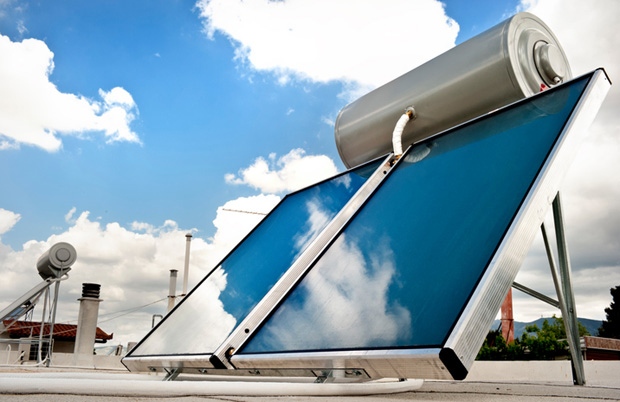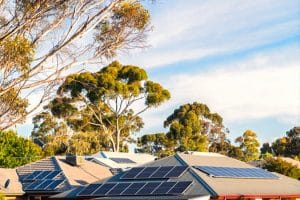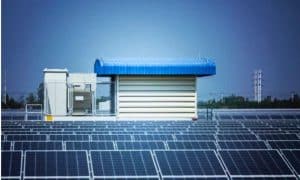Australian company, Vast Solar, was recently announced as part of a consortium that is set to receive US$2.3 million from the United States. According to a press release from the US Energy Department, President Biden’s aim of reaching a net-zero economy by 2050 will be supported by the advancement of concentrated solar thermal power (CSP) technology by the Department of Energy Solar Energy Technologies Office.
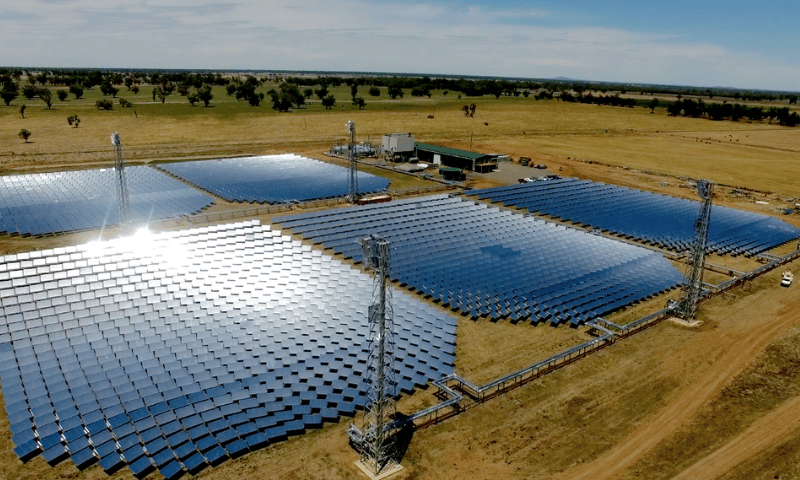
The funding is a part of a total of USD 24 million in grants given by the DOE to advance CSP technologies. These technologies use mirrors to focus solar energy into high-temperature heat, which is then used to generate synchronous and fully dispatchable power to form electricity and industrial processing.
The grant will be used to create and test concepts for thermal energy storage tanks made of molten salt to enhance the efficiency of CSP facilities. The consortium receiving the grant is headed by the US-based renewable technology business Solar Dynamics, including Vast Solar.

Strengthening the tanks will enhance the performance of CSP plants, which are among a select group of established long-duration storage technologies essential for decarbonising industrial process heat and electricity production.
Craig Wood, CEO of Vast Solar said, “Just as important is the Inflation Reduction Act, which changes the game for CSP in the USA. We expect to see a rapid deployment of plants in sunny states throughout the USA, helping the country achieve its decarbonisation goals.”
“With our world-leading, Australia-made CSP technology, Vast Solar will play a big role in the transition, generating clean, low-cost dispatchable energy.”
“Solar-thermal technologies provide a significant opportunity to upgrade and reduce emissions of industrial plants across the nation while meeting America’s energy needs with reliable, around-the-clock power generation”, according to U.S. Secretary of Energy Jennifer M. Granholm.
“DOE’s investments will drive the innovation necessary to build a clean energy economy and meet our climate goals while diversifying the sources of dependable and readily available clean energy.”
DOE’s investments will drive the innovation necessary to build a clean energy economy and meet our climate goals while diversifying the sources of dependable and readily available clean energy.”
Hank Price, Managing Director of Solar Dynamics said, “We are excited to collaborate with Vast Solar on this effort. Vast Solar brings significant knowledge and capabilities to the team, which helped us to prepare a winning proposal for the U.S. Department of Energy Solar Energy Technologies Office.”
“We appreciate that DOE supports the CSP industry’s efforts to improve the design, reliability, and lifetime of molten salt storage.”
Vast Solar is currently developing two CSP projects
The concentrated solar thermal power plant in Port Augusta
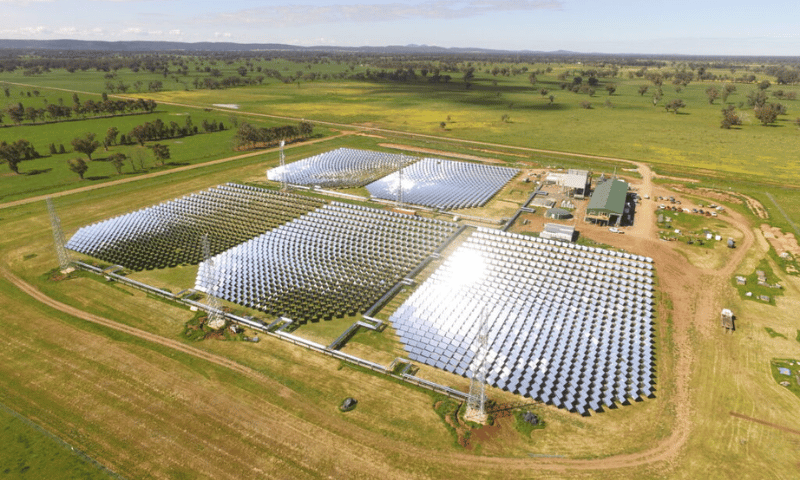
The Australian Government committed to Vast Solar the terms of concessional finance of up to $110 million to support the development of a 30MW CSP with more than eight hours of energy storage project as part of its 2022–23 Budget process. The world leading facility will provide clean, affordable, dependable energy and ignite a manufacturing sector for renewable energy products with a focus on exports, creating hundreds of direct and indirect jobs near Port Augusta, South Australia. Port Augusta was chosen because of its excellent solar resource, reliable electrical grid, and sizable and increasing local demand.
Energy Matters has been a leader in the renewable energy industry since 2005. We can connect you with our trusted local installers, who will provide up to 3 FREE quotes for your home solar energy system. Complete our quick quiz and begin your solar journey today!
$600 million hybrid solar thermal project in Queensland
The 50MW North West Queensland Hybrid Power Project (NWQHPP) and Mount Isa hybrid solar thermal project, being developed in Sydney, will use the same modular tower CSP technology that the business has used at Jemalong in New South Wales. The 50MW solar PV project’s adjacent 1MW pilot plant was built, and it has been supplying the grid with electricity since the beginning of 2018.
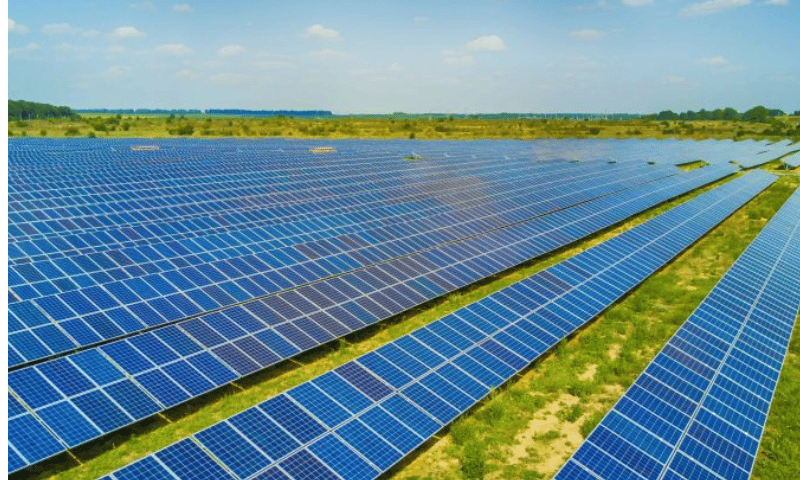
The system combines sodium for heat transfer and molten salt for on-demand storage. It produces steam to power a turbine, unlike traditional CSP technology, which uses molten salt for heat transfer and storage. Thanks to this technology, facilities can be set up with 500MW generators and storage capacities ranging from 4 to 16 hours.
How concentrated solar thermal (CST) works
Solar energy technology, known as concentrated solar thermal (CST), harnesses sunlight to generate heat. With around 2.3 GW in operation, Spain leads the world in using CST to produce energy. The United States comes in second with approximately 1.7 GW in operation.
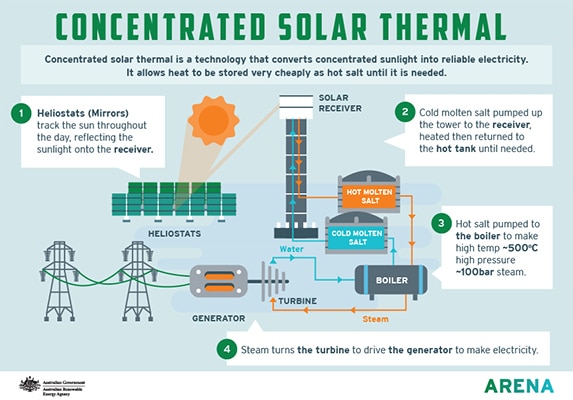
There are several types of concentrated solar thermal plants:
- Linear Fresnel – consists of long rows of flat or slightly curved mirrors that move independently on one axis. The mirrors reflect the sun to fixed linear receivers mounted above them on towers.
- Tower – involves an array of heliostats (large mirrors with two-axis tracking) concentrating sunlight onto a fixed receiver at the top of a tower.
- Dish – a highly efficient emerging technology in which a paraboloidal dish with two-axis tracking focuses sunlight on a point receiver.
- Trough – the most widely deployed technology. It uses parabolic mirrors to track the sun from east to west.













